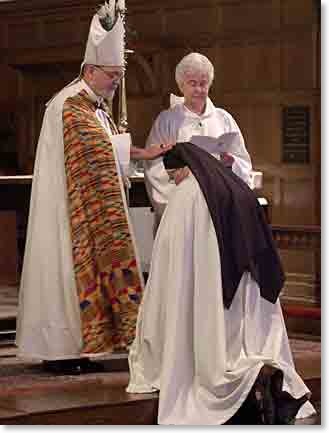Irene Forbes Perkins has already accomplished a lot during her life. The registered nurse was the chief executive of a home health care company in Florida. She led a healing ministry and served as senior warden of her Episcopal parish.
But yesterday, she took the final step toward a new life of contemplative prayer as Sister Teresa Irene of the Heart of God, the founder and coordinator of the first Carmelite order in the worldwide Anglican community.

At a ceremony at the Episcopal Cathedral of the Incarnation in North Baltimore, the nun dedicated her life to God and to the Episcopal Carmel of St. Teresa, a monastery she has started in Rising Sun with the guidance of Roman Catholic Carmelites.
"In a sense, when you look back, it seems most of my life prepared me for what I'm doing," she said in an interview, listing marketing, running a corporate board and a business among her skills.
"God knew what God was doing," said Perkins, 55. "God usually does."
The Anglican Church began in the 16th century when England's King Henry VIII dissolved monastic communities because he wanted to tax church lands, said Bishop Robert W. Ihloff, leader of the Episcopal Diocese of Maryland. But the orders re-emerged in Anglicanism in the mid-1800s, the Rev. Gregory Fruehwirth, the vice president of the Conference of Anglican Religious Orders in the Americas, said in a telephone interview from Wisconsin.
Some Roman Catholic religious orders have counterparts in the Anglican communion, which includes the Episcopal Church in the United States. Like their Catholic equivalents, the approximately 2,400 members of Anglican religious orders worldwide vow to live celibate, obedient lives and don't have private possessions, Fruehwirth said. There are about 300 members in 23 different Episcopal orders in North America today. In Maryland, 16 members of the All Saints Sisters of the Poor live in Catonsville.
Perkins, who grew up in Cincinnati, said she began the process of becoming a nun at the age of 21, but she left the Episcopal Community of Transfiguration after five years.
Many years later, "my sense of vocation came back to haunt me," she said.
Ultimately, unsure of the right next step, Perkins moved to a cabin in Georgia until "I discovered I was not a very good hermit," she said.
She didn't want to be ordained an Episcopal priest - Perkins said her calling was different. She wanted to join a contemplative Episcopal community - one that maintains a deep life of prayer, rather than emphasizing direct social service - but there weren't any in the United States. So, Perkins spent four years with the Sisters of the Love of God in Oxford, England, who draw on the Carmelite tradition, she said.
Perkins came back to the United States after the attacks on the World Trade Center. "I just had a sense that I needed to be here," she said. "I needed to be in this country, with, so to speak, my own people."
But returning to America meant she would have to form her own contemplative community. Perkins did so with the assistance of the Baltimore Carmel, a community of Roman Catholic Carmelite nuns in Lutherville.
The Baltimore Carmel was founded more than 200 years ago - the first group of women religious in what were then the 13 American colonies. "In a way, she's made contact with us in a view of that long tradition, that long history that we have," said Sister Constance FitzGerald, the prioress, in an interview. She gave the sermon yesterday.
"We believe that the world can be transformed by how we live together and how we pray," FitzGerald said.
Carmelites "live a large part of their day in silence," Perkins said. "If I wasn't founding a community, it'd be easier to do that," she said.
People work in silence and alone as much as possible. "I just painted a whole house," Perkins said, referring to the house in Cecil County her order is using. "I did a lot of praying with a roller in my hand." But two hours is set aside for purely recreational talk each day.
She's not alone. In addition to Perkins, one man and one woman have formally promised to join the Episcopal Carmel as lay oblates and two more are preparing to do so. Perkins' group also will receive its 15th associate tomorrow. (Associates follow a less strict rule of discipline than lay oblates.)
The community purchased a 3 1/2 -acre property in Rising Sun this summer. They're supported not by the diocese but through donations from "people who believe that what we're doing has value," Perkins said. "So far, the bills are paid."
Three years ago today, on the feast day of Carmelite reformer St. Teresa of Avila, FitzGerald and Ihloff heard Perkins' profession of first vows. Yesterday, Perkins, wearing an off-white cape on top of her brown-and-white habit, prostrated herself before the altar of the cathedral.
Ihloff then blessed a gold wedding band by sprinkling it with holy water and placed it on her ring finger as a symbol of her consecration and covenant with God.
Sister Alice L. Reid, a member of the Episcopal Community of Transfiguration in Eureka, Calif., who was Perkins' first novice master, said afterward that Perkins' act was courageous.
"I guess none of us would be here if our own foundresses hadn't done it," she said.

